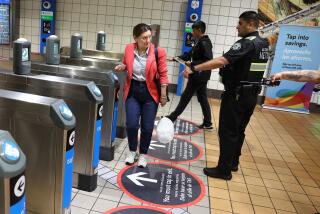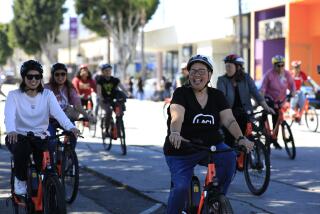Massachusetts’ Book Project : On the Subway, It’s ‘Read, Ride, Return’
CAMBRIDGE, Mass. — Although the sign on the subway station book case says “Read, Ride and Return,” many commuters have been filching books from the rack instead of just borrowing them.
But those associated with the unique program still call it a success.
“I wish we had more books that people could steal, if that could get them to read,” said Bob Dugan, of the Massachusetts Board of Library Commissioners.
Ron Brown, originator of the project, said, “my guess is about half the people that take them return them.
“I’m happy with that figure,” said Brown, the Cambridge Library’s assistant director for public services. “I didn’t know whether it would work at all.”
Ride, Read and Return appears to be here to stay despite the pilfering, because more books are being donated than the number of books not returned, according to Brown.
“We’ve had so many letters and books from people who say they’re supportive and donate box loads of them,” he said.
The number of books being replaced should not be used as a yardstick of success in any case, Brown said in a recent interview.
“It’s meant first to promote reading,” he said. “But it’s also to say, ‘Hey, this is what a public library does, come check us out.”’
Brown believes the program, started in September with a $15,000 grant, is unique in the United States. Much of the money has been spent to buy 3,500 books, all with labels asking commuters to share, and a 150-volume rack at the Porter Square subway station.
“There is money available for further purchases,” said Brown. “But I haven’t spent money for a long, long time. I’ve relied on donations.”
The Massachusetts Board of Library Commissioners came up with the grant, although Brown said board members were skeptical at first.
“Everybody thought I was really crazy. They debated it and debated it, and finally said, ‘Go ahead Ron.’ But they’re really pleased with the outcome.”
Dugan explained the board’s initial reluctance.
“We were really concerned about people’s reaction to it,” he said. “We were so concerned about vandalism and graffiti, but none of that happened.”
Brown said he stocks the rack personally each morning. The fact that it is near empty most of the day shows how avidly commuters snap up the offerings, he said.
“Three-fifths of what I buy is fiction, but I try to appeal to a broad audience,” said Brown. “I bought all kinds of things--modern classics, some foreign language material, children’s books.
“Very few of the children’s books return, but we don’t mind that. It’s in someone’s home,” he said. “A little girl is being read to, or is reading, and part of the idea is to promote literacy.”
Dugan praised the Cambridge Library’s attitude.
“So half the books are missing, so what,” he said. “They didn’t get bent out of shape, they were cool. They didn’t take the rack down, they rolled with it.”
The subway success led Brown to set up another Read, Ride and Return rack recently--in the Cambridge employment office. In addition to popular reading, this bookcase is stocked with career literature.
The pilfering rate is even higher there than at Porter Station, but Brown claims that the benefits again outweigh the losses.
More to Read
Sign up for Essential California
The most important California stories and recommendations in your inbox every morning.
You may occasionally receive promotional content from the Los Angeles Times.










